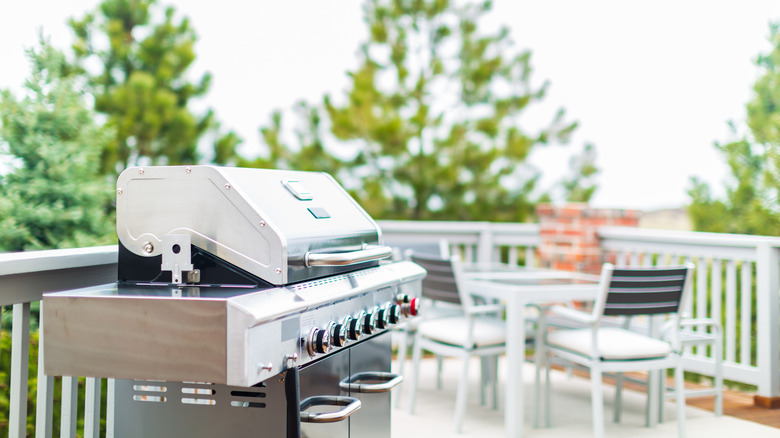Keep Your Grill Lid Covered And Your Meat Will Thank You
Summer temperatures are not conducive to cooking in the kitchen — which is why so many people opt to get outside and use their grills instead. From simple burgers and hot dogs to grilled whole fish and even pizza, there's not much that your trusty back porch cooker can't tackle. Grilling is fairly simple — it's just a controlled fire under a grate, after all. However, there are a couple of important rules you should follow to get the best results. One of the most important principles of grilling is to keep the lid closed whenever you're not moving the food around on the grates.
Just like keeping the oven door closed during baking, every time you open the grill to take a peek at those sizzling sausages you lose a significant amount of heat if you're using a gas grill. It then takes time for the grill to catch up after each opening, which means your food will take longer to cook. It's also a drain on your gas tank because you'll have to keep the grill lit longer to get everything cooked.
If you want to be a true grill master, let the heat do its job and only check on the cooking progress periodically to flip and turn — and don't leave the lid off the entire time.
Keep the lid closed to regulate heat and save fuel
No matter what kind of grill you have, it's never good to keep opening and closing the lid. While it's satisfying to hear some sizzling when you flip things over, you're not managing the heat properly. Gas grills need the lid closed to build up heat in order to cook things much like an oven (the flame itself is mostly for searing). Opening the lid will also cool off the grates, so you'll have a harder time searing things.
An open lid also uses more gas. A medium-sized grill uses around two pounds of propane per meal, and a 20-pound tank (the most common size for gas grills) should last for around 10 meals, or 18-20 hours of cooking time, according to Couch Oil Company. If you notice that you have to replace your tank more often than that, pay closer attention to how often you open the grill lid.
When it comes to charcoal grills, the opposite is true. An open lid turbo charges the coals by flooding the fire with oxygen. So every time you open the lid you are increasing the odds that you'll burn the outside of the food and leave the insides undercooked. The extra air also makes the charcoal burn faster, so you'll use more charcoal if you keep the lid off the grill.
Use thermometers and a timer
The biggest reason why people leave the lid open when they're grilling is to eyeball food for signs of doneness. While many backyard burgers get cooked this way, the results are usually mixed. Grilling with thermometers and a timer gives you much more consistent results and allows you to close the lid with confidence. A successful griller should have at least two thermometers: One fast-read probe model for taking meat temperatures, and one for leaving inside the grill to monitor the grill surface temperature. Don't rely on the thermometer installed in the lid of your grill because it can deteriorate over time when exposed to outdoor elements.
Timers are also essential when grilling because anyone can follow time and temperature guidelines. For example, Weber has an excellent chart of guidelines for commonly grilled foods, including steak, kebobs, potatoes, and more. All you need to do is get your grill up to temperature, put the food on, and set your timer for half of the suggested time to know when to flip. Then, set the timer again for cooking the other side. If you use your thermometers and timer while keeping the lid on the grill, you'll have a lot more success on the barbecue and more time to hang out with your guests.


